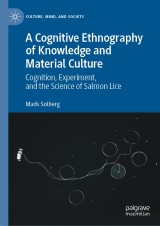Details

A Cognitive Ethnography of Knowledge and Material Culture
Cognition, Experiment, and the Science of Salmon LiceCulture, Mind, and Society
|
117,69 € |
|
| Verlag: | Palgrave Macmillan |
| Format: | |
| Veröffentl.: | 15.06.2021 |
| ISBN/EAN: | 9783030725112 |
| Sprache: | englisch |
Dieses eBook enthält ein Wasserzeichen.
Beschreibungen
<div>This cognitive ethnography examines how scientists create meaning about biological phenomena through experimental practices in the laboratory, offering a frontline perspective on how new insights come to life. An exercise in the anthropology of knowledge, this story follows a community of biologists in Western Norway in their quest to build a novel experimental system for research on <i>Lepeoptheirus salmonis</i>, a parasite that has become a major pest in salmon aquaculture. The book offers a window on the making of this material culture of science, and how biological phenomena and their representations are skillfully transformed and made meaningful within a rich cognitive ecology. Conventional accounts of experiments see their purpose as mainly auxiliary, as handmaidens to theory. By looking closely at experimental activities and their materiality, this book shows how experimentation contributes to knowledge production through a broader set of epistemic actions.<p>In drawing on a combination of approaches from anthropology and cognitive science, it offers a unique contribution to the fields of cultural psychology, psychological anthropology, science and technology studies and the philosophy of science.</p><p> </p></div><div><br></div>
<p>1. Tools for the Study of Scientific Practice.- 2. Salmon Lice: The Environmental History of a Troubled Relationship.- 3. Making a Cognitive Ecology for Experimental Practice.- 4. RNAi: An Instrument for Exploratory Experimentation.- 5. Thinking Through Experiment: Enacting RNAi.- 6. Making Meaning and Measurement in Gene Expression Analysis.- 7. An Anatomy of a Microanatomy.- 8. Concluding Remarks and Future Prospects.</p><br>
<b>Mads Solberg</b> is Associate Professor in the Department of Health Sciences at the Norwegian University of Science and Technology, Aalesund, Norway. He currently teaches and researches how people interact with technology in healthcare. <div><br></div><div><br></div><div>Winner of the 2021 Society for Anthropological Sciences Carol R. Ember Book Prize</div>
This cognitive ethnography examines how scientists create meaning about biological phenomena through experimental practices in the laboratory, offering a frontline perspective on how new insights come to life. An exercise in the anthropology of knowledge, this story follows a community of biologists in Western Norway in their quest to build a novel experimental system for research on <i>Lepeoptheirus salmonis</i>, a parasite that has become a major pest in salmon aquaculture. The book offers a window on the making of this material culture of science, and how biological phenomena and their representations are skillfully transformed and made meaningful within a rich cognitive ecology. Conventional accounts of experiments see their purpose as mainly auxiliary, as handmaidens to theory. By looking closely at experimental activities and their materiality, this book shows how experimentation contributes to knowledge production through a broader set of epistemic actions. In drawing on a combination of approaches from anthropology and cognitive science, it offers a unique contribution to the fields of cultural psychology, psychological anthropology, science and technology studies and the philosophy of science.<p></p>
<p> </p>
<p><b>Mads Solberg</b> is Associate Professor in the Department of Health Sciences at the Norwegian University of Science and Technology, Aalesund, Norway. He currently teaches and researches how people interact with technology in healthcare.</p>
<p> </p>
<p><b>Mads Solberg</b> is Associate Professor in the Department of Health Sciences at the Norwegian University of Science and Technology, Aalesund, Norway. He currently teaches and researches how people interact with technology in healthcare.</p>
Bridges the divide between social and cognitive accounts of knowledge-making Reframes the experiment as a central part of scientific knowledge-production, rather than as an auxiliary process to theory Draws on more than two years of ethnographic fieldwork at a Norwegian biology laboratory

















